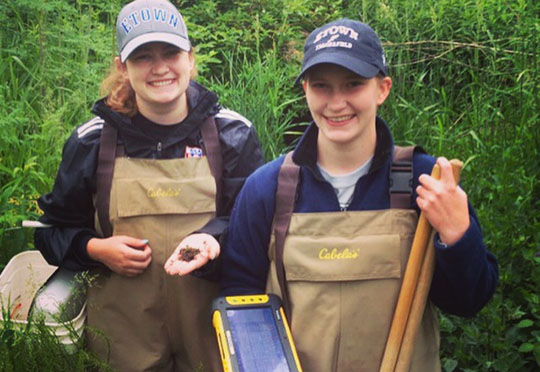Started in the natural sciences, Summer Scholarship, Creative Arts and Research Projects Program now includes more creative arts and humanities projects each year
What began as a sparsely funded program of less than a dozen faculty members and students has become growing annual program for Elizabethtown College students and their advising professors to work on a variety of projects in a professional environment over the summer. Before the Summer Scholarship, Creative Arts and Research Projects (SCARP) program became a formal affair, students had few opportunities to work on research between spring and fall semesters, and the professors who oversaw their work had limited funding.
That’s where Rick Basom, recently retired executive director of Sponsored Research and Programs entered the picture. With his help, the SCARP program was launched and has flourished. Now a more formal affair, students apply for time and resources to stay on campus three to 10 weeks over the summer. So far, all applicants from every application process have been supported in their endeavors. “We’ve been able to fund every SCARP project that has been brought before us,” said Basom.
Every year the number of applicants has risen—more than 30 have applied for the upcoming session. The opportunities for students in this program are almost endless because there are no restrictions on type of work to be researched. If a student wishes to work with Kurt DeGoede in the engineering labs, they need only speak with him. If a scholar desires to work on and produce a theatrical performance, they need only coordinate with a professor in the Department of Fine and Performing Arts.
The types of projects and research were, originally, more in the lab sciences, but a shift toward more interests in the humanities has occurred. This is illustrated by the list of students presently taking part in SCARP— philosophy, art, political science, mixed in with the biology, chemistry, engineering and physics majors.
Jennah Krause ’18 is a biology major who has participated in the SCARP program since her first year at E-town. Together with her research partner, Alyssa Taylor ’18, she worked on research projects where time played a major role in the accuracy of the data. The first research, requested by Krause’s faculty advisor David Bowne, associate professor of biology, explored how changing a stream to a wetland system affected the salamanders and frogs living there.
This project lead the students to take part in a second.
The presence of SCARP gave them the opportunity to work on these projects beyond a normal semester and gave Krause the opportunity to develop her public speaking and critical thinking skills.
“I was able to develop an extremely close relationship with my faculty mentor in ways that I don’t think I would have been able to without the program … in class I wouldn’t have gotten that opportunity,” she said.


